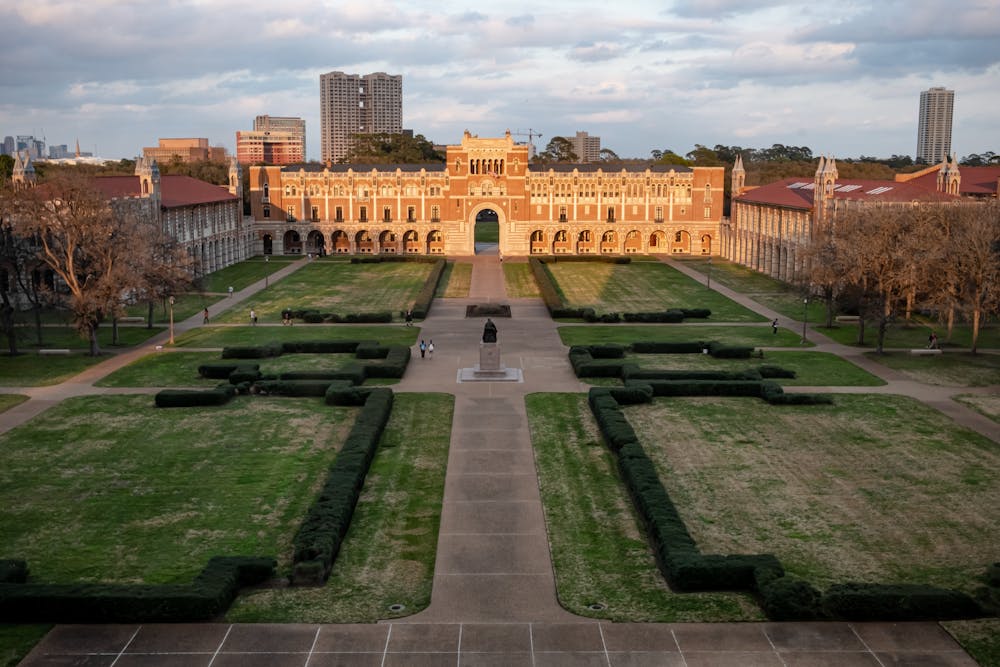Administration affirms commitment to diversity

President Reginald DesRoches announced Rice’s commitment to diversity ahead of anticipated Supreme Court rulings on affirmative action cases in a campus-wide email sent on March 3, cosigned by Provost Amy Dittmar and Vice Provost for Diversity, Equity and Inclusion Alexander Byrd.
“Diversity at Rice is not just tolerated, it is celebrated as a strength of this great institution,” DesRoches wrote in his email, recounting his investiture speech.
The announcement preemptively responds to upcoming Supreme Court rulings on cases challenging race-conscious admissions in higher education. Students for Fair Admissions v. President and Fellows of Harvard College and Students for Fair Admissions v. University of North Carolina allege that considering race as a factor in admissions violates the Civil Rights Act of 1964 and the 14th Amendment.
DesRoches wrote that the rulings will not significantly impact diversity, equity and inclusion on campus in an email to the Thresher.
“Because of our holistic approach to admissions and faculty hiring, not a lot will change for us here at Rice,” DesRoches said.
Dittmar said holistic review establishes diversity among Rice students.
“The [admissions] process ensures that each application is reviewed in the context of a student’s academic background, as well as their personal life experience,” Dittmar said. “It has helped to create a student body that is diverse in terms of race, ethnicity, socioeconomic background, gender, geography, culture, education and other perspectives.”
According to DesRoches’ announcement, holistic review continues to influence Rice student demographics, citing that the percentage of students from underrepresented minority groups is up 3% from last year.
Beyond admissions and enrollment, DesRoches’ email listed a range of new and ongoing initiatives designed to uphold a “diverse, equitable and inclusive” environment at Rice, including financial aid through the Rice Investment, support for first generation students, the Analyzing Diversity undergraduate general education requirement and graduate student programs.
Duncan College junior Briana Gellineau said that she still sees barriers to equity and inclusion within residential college communities.
“I’ve seen a lot of friends have issues with Resident Associates at their colleges, like seeing them use stereotypes and microaggressions,” Gellineau said.
Gellineau also said that not all spaces on campus welcome marginalized populations.
“I don’t personally identify [as LGBTQ], but a lot of friends in the community have come to me saying, ‘I don’t feel safe in these situations and environments,’” Gellineau said.
Byrd said that departments and offices across Rice work to address the structural factors that influence the needs of students.
“Investments — material, social, and intellectual — in maintaining and further enriching a diverse, inclusive campus environment are evident throughout the university,” Byrd wrote in an email to the Thresher.
Outside of the undergraduate class, Dittmar said Rice has doubled the number of Black professors in the past five years and increased the number of female faculty hires, recruiting a diverse faculty class.
“Recruiting, developing and retaining a more diverse faculty and attracting excellent graduate students from diverse backgrounds to work with them isn’t about numbers,” Dittmar said. “It creates critical teaching and community advantages, informs complex problem-solving and offers diverse perspectives and mentors for all students.”
Byrd said that Rice endeavors to promote ongoing conversations that are crucial for nurturing equity on campus.
“The university … is very often at its best when it creates spaces for productive discussion and debate on what a diverse, inclusive, equitable society might look like,” Byrd said. “The upcoming Heather McGhee lecture event — made possible through the collaboration of several entities across campus — is one such example.”
Looking ahead to the Supreme Court decision, Dittmar said that Rice’s commitment to diversity remains strong.
“Regardless of the outcome, diversity, equity inclusion and excellence are foundational values of the university,” Dittmar said. “We will do all that we can within the bounds of the law to recruit and retain a diverse student body and faculty.”
More from The Rice Thresher

Rice to support Harvard in lawsuit against research funding freeze
Rice, alongside 17 other research universities, filed an amicus curiae brief in support of Harvard University’s lawsuit against the Trump administration over more than $2 billion in frozen research grants.

Mayor Whitmire discusses ‘the state of Houston’ between audience protests at Baker Institute
John Whitmire’s remarks on the city’s budget, transportation and infrastructure were interrupted twice by shouts from audience members at a Baker Institute event May 29. At the event, which was open to the public, Whitmire spoke about the current state of Houston alongside former county judge Ed Emmett.
Rice reaffirms support for international students after Trump administration targets Harvard
Rice and the Office of International Students and Scholars said in a May 23 email that they are monitoring the Trump administration’s actions towards Harvard to bar the school from enrolling international students. A federal judge temporarily halted the move less than 24 hours later.


Please note All comments are eligible for publication by The Rice Thresher.